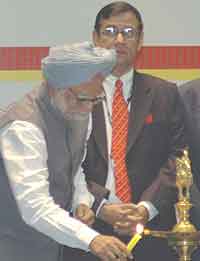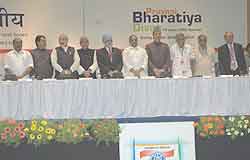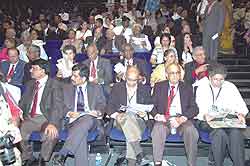|
PRAVASI PUNCH
They may be scattered in the remotest territories on
earth but when the call of the 4th Pravasi Bharatiya Divas came, they assembled in numbers. And this time the Indian establishment was also responded positively
Empire Bureau
|

|
|
|
Way back in 1999, J.C. Sharma knew that the world was becoming a global village. As Consul-General in Chicago at the time, the idea of a congregation of the Indian diaspora scattered worldwide, appealed strongly to Sharma. Having analysed the role the diaspora played in boosting India’s economic, social and cultural growth and bringing the world closer, he knew that an assembly of non-resident Indians (NRIs) and people of Indian origin (PIOs) under one roof would be a great morale booster. Thus was born the concept of Pravasi Bharatiya Divas in 2002. Symbolically held on the 9th of January to coincide with the return of Mahatma Gandhi to India after a long stay in South Africa, PBD as it has come to be known, signals the commitment of the global Indian towards India.
|
|
 
|
|
Four years later, Pravasi Bharatiya Divas has become a big-ticket, power packed event, attracting Prime Ministers, Presidents, hordes of chief ministers and Indians of all hue and shape from every possible country and territory in the world.
The objective of having a dedicated event like Pravasi Bharatiya Divas is creating a web-like relationship between India and its Diaspora, rather than having a hub and spoke equation. Both can collectively play roles of mutually reinforcing communities and PBD is an effort in realising that. The choice of Hyderabad as venue was perfect.
Hyderabad is a symbol of a city on the move. Thanks to its IT and biotech boom, the city of the Charminar has now become one of the most cosmopolitan cities in the country. It is the only city to have an international convention centre in the country. The rotation of venues (Delhi, Mumbai and now Hyderabad) itself represents the fact that PBD is an extremely dynamic concept, open to change and improvisation for the greater good.
Hyderabad was transformed into a fortress for the event. Coming soon after the terror strike in Bangalore, the authorities were taking no chances. Dozens of policemen were deployed at the newly constructed Hyderabad International Convention Centre, the venue of the inaugural session. The entire Madhapur area, also known as Hitec City or Cyberabad, became a no-entry zone.
|
|
The PM launched the Overseas Citizen of India scheme that confers a hassle-free, life-long multiple entry visa for overseas Indians |
|
|
The show, however, began on a positive note. Inaugurating the 4th Pravasi Bharatiya Divas, Prime Minister Manmohan Singh unveiled a string of initiatives for the benefit of NRIs, and said the government would soon grant voting rights to overseas Indian workers and professionals, launch a liberal insurance scheme for them and modernise the process of emigration. The Prime Minister launched the Overseas Citizen of India (OCI) scheme that confers a hassle-free, life-long multiple entry visa for overseas Indians.
Amidst applause from a gathering of about 2,000 NRIs from across the world, Singh handed over the first set of OCI Cards and related documents to two NRIs—Nibriti Rai (US) and Ifthekar Ahmad Sharif—fulfilling a long cherished dream of overseas Indians. The OCI Cards, considered the first step towards conferring full citizenship rights, will enable overseas Indians holding foreign passports free access to the country, obliterating the need for police verification.
“Of the three categories of NRIs, overseas Indians in Gulf are unique. They are NRIs who will never become naturalised citizens of those countries. Their demand seeking voting rights at home has, therefore, a convincing political basis,” the Prime Minister said. The proposal to grant voting rights to such a category of NRIs was at an advanced stage of consideration, he said.
|
|
Chidambaram assured overseas Indians the government would follow sensible economic policies so they can send money to families with greater confidence |
|
|
President A.P.J. Abdul Kalam’s address at the valedictory session was perhaps the most moving. He said: “Today, the 9th day of January, marks the return of Gandhiji from South Africa to India 91 years ago. His work in South Africa and reasons of his return are well known. The point I would like to make is that when Gandhiji returned, he travelled from one colony to another of an Empire on whose territory; the sun would never set at that time. It would not be an exaggeration, if I say that today the sun truly cannot set on the empire of the Indian Mind. Some children of Mother India are always working wherever the sun is shining on this planet be it Asia, Africa, Australia, Europe, the Americas and, indeed, on the icy reaches of Antarctica. Twenty million children of India live in various parts of the planet and every year it is increasing, because they are needed.”
|
|
More...
|
|
|
|
February 2006
|
|

|
|
|
|